专四语法第1节-语法基本概念
- 格式:doc
- 大小:78.50 KB
- 文档页数:10
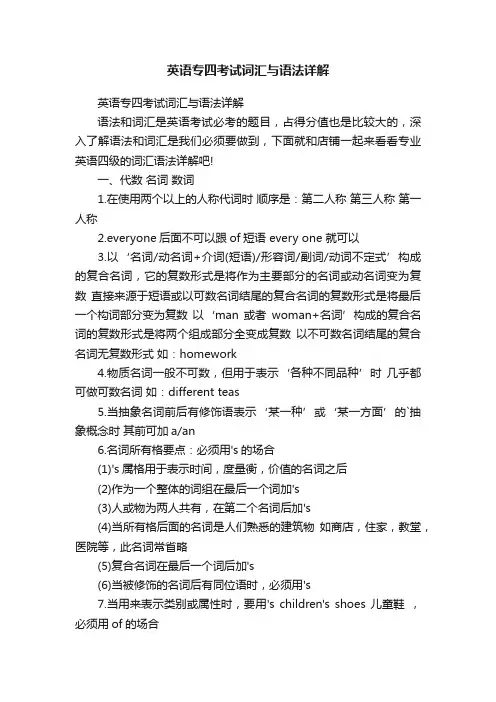
英语专四考试词汇与语法详解英语专四考试词汇与语法详解语法和词汇是英语考试必考的题目,占得分值也是比较大的,深入了解语法和词汇是我们必须要做到,下面就和店铺一起来看看专业英语四级的词汇语法详解吧!一、代数名词数词1.在使用两个以上的人称代词时顺序是:第二人称第三人称第一人称2.everyone后面不可以跟of短语 every one 就可以3.以‘名词/动名词+介词(短语)/形容词/副词/动词不定式’构成的复合名词,它的复数形式是将作为主要部分的名词或动名词变为复数直接来源于短语或以可数名词结尾的复合名词的复数形式是将最后一个构词部分变为复数以‘man 或者woman+名词’构成的复合名词的复数形式是将两个组成部分全变成复数以不可数名词结尾的复合名词无复数形式如:homework4.物质名词一般不可数,但用于表示‘各种不同品种’时几乎都可做可数名词如:different teas5.当抽象名词前后有修饰语表示‘某一种’或‘某一方面’的`抽象概念时其前可加a/an6.名词所有格要点:必须用's的场合(1)'s属格用于表示时间,度量衡,价值的名词之后(2)作为一个整体的词组在最后一个词加's(3)人或物为两人共有,在第二个名词后加's(4)当所有格后面的名词是人们熟悉的建筑物如商店,住家,教堂,医院等,此名词常省略(5)复合名词在最后一个词后加's(6)当被修饰的名词后有同位语时,必须用's7.当用来表示类别或属性时,要用's children's shoes 儿童鞋,必须用of的场合(1)名词后跟有后置修饰语或同位语时(2)以定冠词加分词或形容词表示一类人时如果dozen/score/hundred/thousand/million前有基数词以表示确切数目时,都不能用复数形式如果用来表示很多有不确切的数目时,须用复数,而且后面加of8.表示顺序的两种方式:(1)'名词+基数词',不用冠词,如Chapter four(2)' the+序数词+名词' 如the Fourth Chapter9.倍数增减的表示法(1) 倍数+形容词/副词比较级+than(2) 倍数+as+形容词/副词+as(3) 倍数+名词(4) 动词+百分比或倍数(5) 动词+to+数词(6) double/triple/quadruple+名词(7) 动词+by+数词/百分比/倍数10.分数分子为基数词,分母为序数词分母除了在分子为一的其他情况下为复数11.百分比后接名词时加of二、形容词副词(1)前置修饰语的排列顺序可以至于冠词前的形容词(all both such) -----冠词,指示形容词,所有格形容词,不定形容词(a an the this your his any some)-----------基数词(one ) 序数词(first)------------ 表示性质,状态,质量的形容词(good useful)--------------表示大小,长短,形状的形容词----------------表示年龄,新旧,温度的形容词------------表示颜色的形容词---------------------表示国籍,产地,区域的形容词-----------表示材料,用做形容词的名词----------动名词,分词(2)后置修饰语由前缀a-构成的形容词(3)形容词修饰由some-,any-,every-,no-,-body,-one,-thing等组成的复合不定代词时,必须后置(4)enough作形容词修饰名词时既可放前又可放后,但当它作副词修饰形容词或副词时,必须后置(5)有些形容词本身就有’比…年长‘,’比…… 优等的意思这些形容词后面用介词to 而不用than(6)much too 作为副词短语修饰形容词或副词,不修饰名词(7)more 不能用来修饰比较级(8)与名词连用的more of a …/as much of a…/more of a…意为更像…(9)as much o f a…意为称得上,less of a 意为算不上(10)none other than(不是别人,正是)=no other than(11)any/some/every与other连用时,其后若用可数名词,一般为单数三、情态动词(1)can 用于否定句cannot(help)but表示不能不,只能(but后跟不带to的动词不定式)(2)must 表示禁止,一定不要时的否定式为mustn't 当它表示有把握的推断时意为一定准是时它的否定形式为can't(3)need doing=need to be done 这个句型表示被动意味(4)need not have done sth 表示本来没有必要做某事 (经常考)四、虚拟语气从句主句(1)与过去事实相反 had+过去分词 should(第一人称)would(其它人称)+have+过去分词与现在事实相反一般过去式(动词be用were) would/should/could/might+动词原型与将来事实相反过去式或should/were+动原would/should/could/might+动词原型(2)It is (high/about/the)time……谓语动词用过去式指现在或将来的情况表示早该做某事而现在已经有点晚了(3)It is the first(second/third)time后的that从句中,谓语动词要用完成体来表示一种经验(4)as if/though 的虚拟要点(5)对当时事实的假设,从句谓语用过去式,be动词一律用were(6)对过去事实的假设,从句谓语用过去完成式(7)对未来事实的假设,从句谓语用would+动词原型【英语专四考试词汇与语法详解】。
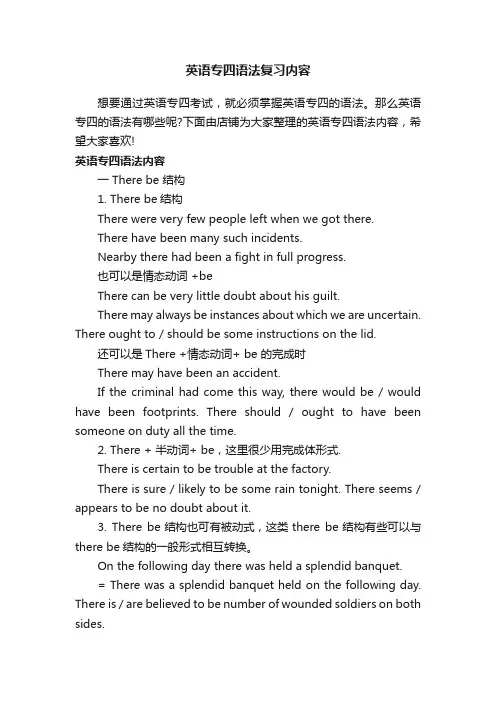
英语专四语法复习内容想要通过英语专四考试,就必须掌握英语专四的语法。
那么英语专四的语法有哪些呢?下面由店铺为大家整理的英语专四语法内容,希望大家喜欢!英语专四语法内容一 There be 结构1. There be结构There were very few people left when we got there.There have been many such incidents.Nearby there had been a fight in full progress.也可以是情态动词 +beThere can be very little doubt about his guilt.There may always be instances about which we are uncertain. There ought to / should be some instructions on the lid.还可以是There +情态动词+ be 的完成时There may have been an accident.If the criminal had come this way, there would be / would have been footprints. There should / ought to have been someone on duty all the time.2. There + 半动词+ be,这里很少用完成体形式.There is certain to be trouble at the factory.There is sure / likely to be some rain tonight. There seems / appears to be no doubt about it.3. There be结构也可有被动式,这类there be结构有些可以与there be结构的一般形式相互转换。
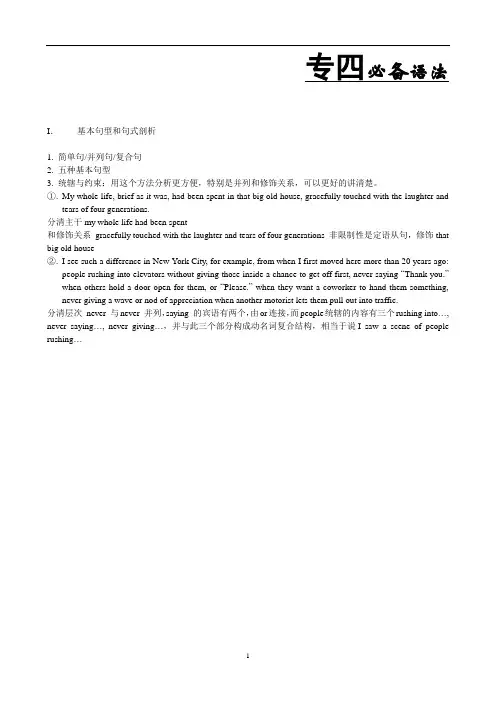
专四必备语法I.基本句型和句式剖析1. 简单句/并列句/复合句2. 五种基本句型3. 统辖与约束:用这个方法分析更方便,特别是并列和修饰关系,可以更好的讲清楚。
①.My whole life, brief as it was, had been spent in that big old house, gracefully touched with the laughter andtears of four generations.分清主干my whole life had been spent和修饰关系gracefully touched with the laughter and tears of four generations 非限制性是定语从句,修饰that big old house②.I see such a difference in New York City, for example, from when I first moved here more than 20 years ago:people rushing into elevators without giving those inside a chance to get off first, never saying “Thank you.”when others hold a door open for them, or “Please.” when they want a coworker to hand them something, never giving a wave or nod of appreciation when another motorist lets them pull out into traffic.分清层次never 与never 并列,saying 的宾语有两个,由or连接,而people统辖的内容有三个rushing into…, never saying…, never giving…,并与此三个部分构成动名词复合结构,相当于说I saw a scene of people rushing…③.It adds priceless panache (n.) to your understanding of the way people behave.注意add sth. to 分割的状况II. 词法部分1.名词与代词1)不可数名词的量化表示修饰可数名词复数: many, a good/great many,a good/great/large number of修饰不可数名词: much, a great deal of, a large amount of两者都可修饰: a lot of, lots of, plenty of, a great/large quantity of, quantities of, a large sum of2)在汉语中可数,但在英语中为不可数名词的某些词advice, baggage (luggage), damage, equipment, furniture, homework, information, news ...3) 与所指代的名词在性、数、格上是否一致如:Each cigarette a person smokes does some harm, and eventually he may get a serious disease from its effect.It was during the 1920’s that the friendship between the two American writers Hemingway and Fitzgerald reached its highest point.4) that, one的指代作用that指代不可数名词和单数可数名词(如是复数,用those),后面通常跟有修饰语,如出现在比较结构中的that of。
![英语专业四级考试语法精讲[1]](https://uimg.taocdn.com/a66f1368561252d380eb6e8d.webp)
英语专业四级考试—语法精讲虚拟语气第一部分:概述虚拟语气类型(宾语从句;状语从句;名词性从句(主语从句,同位语从句,表语从句);定语从句;特殊类型(感叹句);省略if 的虚拟法(倒装))ExamplesThe rapid change of society requires that college students adapt to the world outside campus by getting to know the society.I would rather that you did nothing for the time being.I wish that I were a student again.I wished that I had followed his suggestion.名词性从句中的虚拟主语从句(it is +adj./p.p that)同位语从句(The +n. that )表语从句(n. +be that)省略if 的虚拟法(倒装)(1)虚拟语气中如果从句引导词if / whether 省略,从句中需要倒装,提前助动词(系动词)或情态动词。
Eg. If it should rain tomorrow, we would not be able to have the sports meeting.=Should it rain tomorrow, we should not be able to have the sports meeting.省略if 的虚拟法(倒装)(2)Eg. Whether it (may) be fine or rainy, we would have the sports meeting. =Be it fine or rainy, we would have the sports meeting.If she had been given more information, she could have answered the questions.=Had she been given more information, she could have answered the questions.第二部分详解&总结虚拟语气的动词标志―insist, suggest, require, request, demand, propose, prefer, maintain, move,urge, recommend, command, order‖等动词表“建议、愿望”时,其后宾语从句中谓语动词要用虚拟语气。
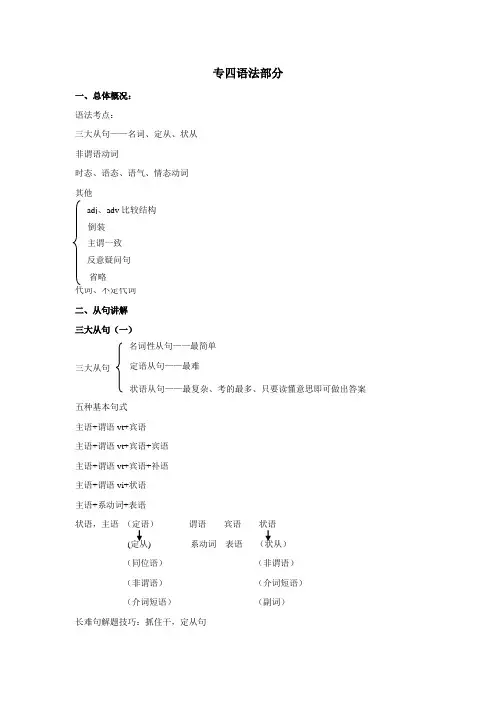
专四语法部分一、总体概况:语法考点:三大从句——名词、定从、状从非谓语动词时态、语态、语气、情态动词其他二、从句讲解三大从句(一)三大从句五种基本句式主语+谓语vt+宾语主语+谓语vt+宾语+宾语主语+谓语vt+宾语+补语主语+谓语vi+状语主语+系动词+表语状语,主语(定语)谓语宾语状语(定从) 系动词表语(状从)(同位语)(非谓语)(非谓语)(介词短语)(介词短语)(副词)长难句解题技巧:抓住干,定从句逗号原则:在英语句子中,逗号是不能连接两个独立完整的句子的。
名词性从句三大从句(二)两步解题法1.抓连词2.状从中的连接词——常考固搭so…that in order that such…that with the result that so thatthat引导名词性从句——that+完整句子(1)主语从句e.g. It is true that he passed the exam.It is said that he passed the exam.It is a pity that he didn’t pass the exam.强调句式It is/was+被强调部分+that+不完整句子主、宾、表、状e.g. I met him in the street.It was him that I met in the street.It was in the street that I met him.(2)宾语从句主+谓语vt+(that)+完整句子e.g. I know (that) he passed the exam.(3)表语从句主+系动词+that+完整句子e.g. My suggestion is that he go with us tomorrow.(4)同位语从句抽象名词+that+完整句子e.g. My suggestion that he go with us tomorrow.There is/are +抽象名词+that+完整句子Answer,belief,concept,conclusion,decision,discovery,doubt,evidence,sign,fact,hope,idea,informati on,knowledge,suggestion,thought,probability…On the condition that…Despite the fact that…On the understanding that…that 引导限定性定从all some any one(s) every each…the first the lastthe only the veryn+that+不完整句子作从句中的主、宾、表语e.g. The book that was written by him is pop.that引导同位语从句抽象名词+that+完整句子that 引导限定性定从n+that+不完整句子作从句中的主、宾、表语The fact that he passed the exam was true.The fact that he found was true.三大从句(三)What=all that; the thing that; the person thatWhat 只引导主从、宾从、表从,不能引导定从和同位从What+不完整句子What he said made me happy.e.g. _____it turned out,it was Italian movie.A What_____it turned out was Italian movie.A WhatI know what he said.I listen to what he said.This is what he said.词______+ 不完整句子n A what Xvt/介词/系动词 A what 可以考虑词,_______+不完整句子A whatB whichC thatwhat 与how 的区别I don’t know what to do.I don’t know how to do it.I’m thinking of ______to do about it.A.whatB. how介词短语在句子的位置1)作状语句子+介短/介短+句子2)作定语n+介短3)作表语系+介短wh—ever与no matter wh—区别让步、名从让步I don’t believe whatever he said.Whatever happens,don’t panic.公式however + adj/adv + 主语+ 谓语e.g. It caused them to think about _______they might control the experiences of children to duce responsible and productive adults.A. whatB. howC. whateverD. however if 与 whether 的区别 if_______about the university the mind, love, dreams, or ordering a drink. A) whatB) whether C) while D) if Never ask a child _______he likes or dislikes.A) what B) whether C) that D) which We know, however,________ no two places are exactly the same. A) Although B) whether C) since D) that 三大从句(四) 定语从句两步解题法1. 抓先行项(指人、物、整句话内容)2. 抓关系词在定语从句中的成分e.g. This is the house_______①I once lived.②I once visited.①where/in which②that/which/xThis is the very house_________ I once visited.e.g. I’ll never forget the day______①I met him.②I spent with him.①when/on which②that/which/xI’ll never forget the very day______ I spent with him. 地点n where 主+谓vt+宾/宾/宾补主+谓vi主+系+表时间n when 主+谓vt+宾/宾/宾补主+谓vi 主+系+表the reason why 主+谓vt+宾/宾/宾补 主+谓vi 主+系+表 三大从句(五)Which 在专四考试中,只考定语从句。
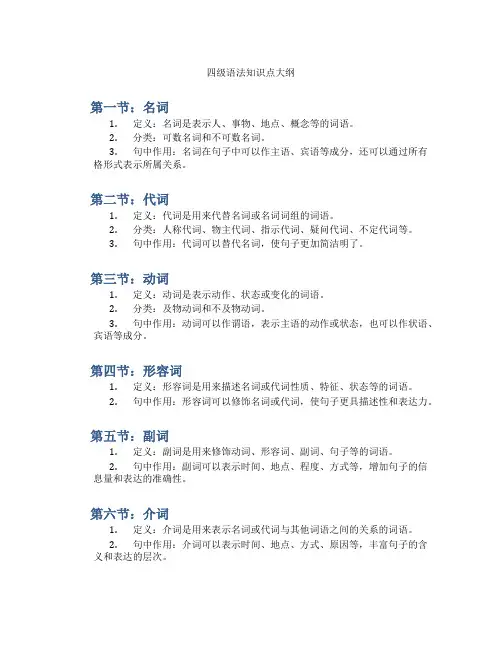
四级语法知识点大纲第一节:名词1.定义:名词是表示人、事物、地点、概念等的词语。
2.分类:可数名词和不可数名词。
3.句中作用:名词在句子中可以作主语、宾语等成分,还可以通过所有格形式表示所属关系。
第二节:代词1.定义:代词是用来代替名词或名词词组的词语。
2.分类:人称代词、物主代词、指示代词、疑问代词、不定代词等。
3.句中作用:代词可以替代名词,使句子更加简洁明了。
第三节:动词1.定义:动词是表示动作、状态或变化的词语。
2.分类:及物动词和不及物动词。
3.句中作用:动词可以作谓语,表示主语的动作或状态,也可以作状语、宾语等成分。
第四节:形容词1.定义:形容词是用来描述名词或代词性质、特征、状态等的词语。
2.句中作用:形容词可以修饰名词或代词,使句子更具描述性和表达力。
第五节:副词1.定义:副词是用来修饰动词、形容词、副词、句子等的词语。
2.句中作用:副词可以表示时间、地点、程度、方式等,增加句子的信息量和表达的准确性。
第六节:介词1.定义:介词是用来表示名词或代词与其他词语之间的关系的词语。
2.句中作用:介词可以表示时间、地点、方式、原因等,丰富句子的含义和表达的层次。
第七节:连词1.定义:连词是用来连接单词、短语或句子的词语。
2.分类:并列连词、从属连词。
3.句中作用:连词可以让句子结构更加完整,使语言更加流畅。
第八节:数词1.定义:数词是表示数量或顺序的词语。
2.分类:基数词和序数词。
3.句中作用:数词可以表示数量、顺序或比较,使句子更具体、准确。
第九节:感叹词1.定义:感叹词是用来表示强烈的情感或感叹的词语。
2.句中作用:感叹词可以表达惊讶、赞叹、喜悦等情绪,增强句子的感情色彩。
通过以上九个知识点的学习,我们可以更好地理解和运用英语语法。
掌握这些知识点,对于学习和提高自己的英语水平具有重要的帮助。
希望大家能够认真学习,不断练习,进一步提升自己的英语能力。


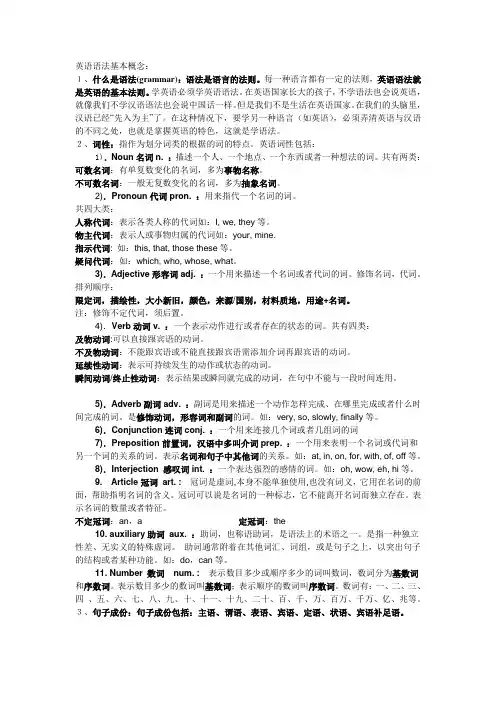
英语语法基本概念:1、什么是语法(grammar):语法是语言的法则。
每一种语言都有一定的法则,英语语法就是英语的基本法则。
学英语必须学英语语法。
在英语国家长大的孩子,不学语法也会说英语,就像我们不学汉语语法也会说中国话一样。
但是我们不是生活在英语国家。
在我们的头脑里,汉语已经“先入为主”了。
在这种情况下,要学另一种语言(如英语),必须弄清英语与汉语的不同之处,也就是掌握英语的特色,这就是学语法。
2、词性:指作为划分词类的根据的词的特点。
英语词性包括:1).Noun名词n. :描述一个人、一个地点、一个东西或者一种想法的词。
共有两类:可数名词:有单复数变化的名词,多为事物名称。
不可数名词:一般无复数变化的名词,多为抽象名词。
2).Pronoun代词pron. :用来指代一个名词的词。
共四大类:人称代词:表示各类人称的代词如:I, we, they等。
物主代词:表示人或事物归属的代词如:your, mine.指示代词: 如:this, that, those these等。
疑问代词:如:which, who, whose, what。
3).Adjective形容词adj. :一个用来描述一个名词或者代词的词。
修饰名词,代词。
排列顺序:限定词,描绘性,大小新旧,颜色,来源/国别,材料质地,用途+名词。
注:修饰不定代词,须后置。
4).Verb动词v. :一个表示动作进行或者存在的状态的词。
共有四类:及物动词:可以直接跟宾语的动词。
不及物动词:不能跟宾语或不能直接跟宾语需添加介词再跟宾语的动词。
延续性动词:表示可持续发生的动作或状态的动词。
瞬间动词/终止性动词:表示结果或瞬间就完成的动词,在句中不能与一段时间连用。
5).Adverb副词adv. :副词是用来描述一个动作怎样完成、在哪里完成或者什么时间完成的词。
是修饰动词,形容词和副词的词。
如:very, so, slowly, finally等。
6).Conjunction连词conj. :一个用来连接几个词或者几组词的词7).Preposition前置词,汉语中多叫介词prep. :一个用来表明一个名词或代词和另一个词的关系的词。
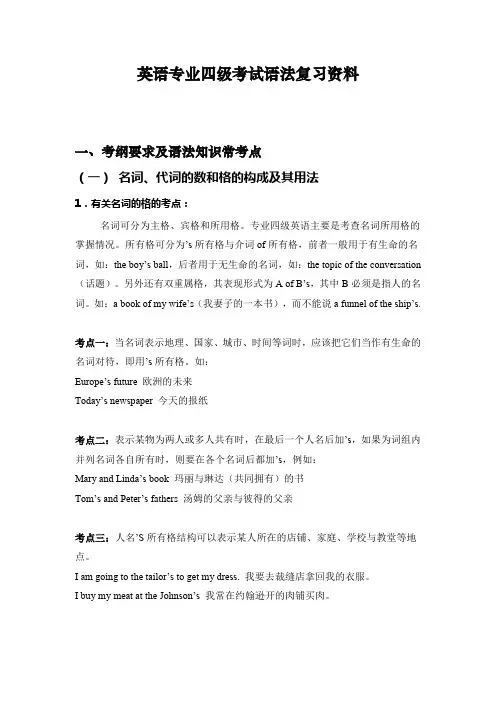
英语专业四级考试语法复习资料一、考纲要求及语法知识常考点(一)名词、代词的数和格的构成及其用法1.有关名词的格的考点:名词可分为主格、宾格和所用格。
专业四级英语主要是考查名词所用格的掌握情况。
所有格可分为’s所有格与介词of所有格,前者一般用于有生命的名词,如:the boy’s ball,后者用于无生命的名词,如:the topic of the conversation (话题)。
另外还有双重属格,其表现形式为A of B’s,其中B必须是指人的名词。
如:a book of my wife’s(我妻子的一本书),而不能说a funnel of the ship’s.考点一:当名词表示地理、国家、城市、时间等词时,应该把它们当作有生命的名词对待,即用’s所有格。
如:Europe’s future 欧洲的未来Today’s newspaper 今天的报纸考点二:表示某物为两人或多人共有时,在最后一个人名后加’s,如果为词组内并列名词各自所有时,则要在各个名词后都加’s,例如:Mary and Linda’s book 玛丽与琳达(共同拥有)的书Tom’s and Peter’s fathers 汤姆的父亲与彼得的父亲考点三:人名’S所有格结构可以表示某人所在的店铺、家庭、学校与教堂等地点。
I am going to the tailor’s to get my dress. 我要去裁缝店拿回我的衣服。
I buy my meat at the Johnson’s 我常在约翰逊开的肉铺买肉。
They took part in the birthday party at Tom’s. 他们参加了在汤姆家举行的生日宴会。
2. 有关名词数的考点:考点一:复合名词的复数:一般而言,我们把核心词变为复数形式即可,如:passers-by, mothers-in-law; assistant directors;girl friends,但当修饰词是man,woman时,复合词各组成部分都要变为复数,例如:menservants,womenservants考点二:复数形式的名词用于单数概念,其谓语动词用单数。
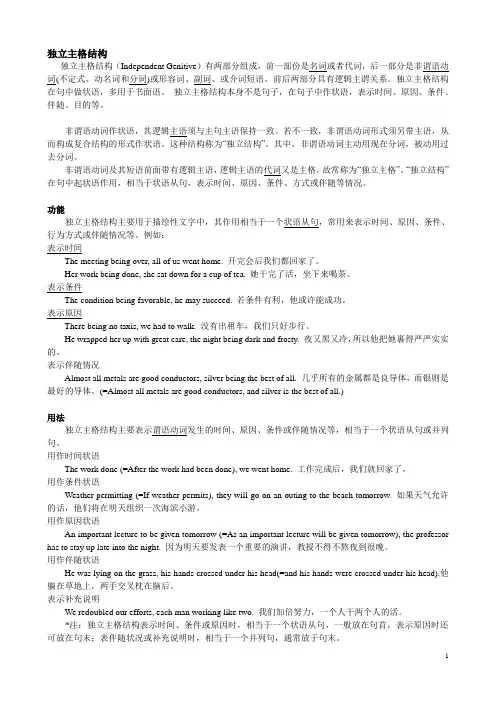
独立主格结构独立主格结构(Independent Genitive)有两部分组成,前一部份是名词或者代词,后一部分是非谓语动词(不定式、动名词和分词)或形容词、副词、或介词短语。
前后两部分具有逻辑主谓关系。
独立主格结构在句中做状语,多用于书面语。
独立主格结构本身不是句子,在句子中作状语,表示时间、原因、条件、伴随、目的等。
非谓语动词作状语,其逻辑主语须与主句主语保持一致。
若不一致,非谓语动词形式须另带主语,从而构成复合结构的形式作状语。
这种结构称为“独立结构”。
其中,非谓语动词主动用现在分词,被动用过去分词。
非谓语动词及其短语前面带有逻辑主语,逻辑主语的代词又是主格,故常称为“独立主格”。
“独立结构”在句中起状语作用,相当于状语从句,表示时间、原因、条件、方式或伴随等情况。
功能独立主格结构主要用于描绘性文字中,其作用相当于一个状语从句,常用来表示时间、原因、条件、行为方式或伴随情况等。
例如:表示时间The meeting being over, all of us went home. 开完会后我们都回家了。
Her work being done, she sat down for a cup of tea. 她干完了活,坐下来喝茶。
表示条件The condition being favorable, he may succeed. 若条件有利,他或许能成功。
表示原因There being no taxis, we had to walk. 没有出租车,我们只好步行。
He wrapped her up with great care, the night being dark and frosty. 夜又黑又冷,所以他把她裹得严严实实的。
表示伴随情况Almost all metals are good conductors, silver being the best of all. 几乎所有的金属都是良导体,而银则是最好的导体。
名词性从句、定语从句名词性从句 三大从句定语从句 状语从句 主语从句 宾语从句 名词性从句表语从句 同位语从句两步解题法 1.抓连词2.抓连词在名词性从句中的成分连接词 -- that whether if (宾从)连词连接代词 -- what(ever) which(ever) who(ever) whom(ever) whose 连接副词 -- how(ever) when(ever) where(ver) why英语专业四级语法讲义代词that名从中连接词--考与what的区别连词限定性定从中关代--考与which的区别强调句式--注意与主从的区别状从中连接词--常考固搭状从中的连接词--常考固搭so…that in order that such…that with the result thatso thatthat引导名词性从句--that + 完整句子(1)主语从句It is/was + adj.-ed+that +完整句子某些名词e.g. It is true that he passed the exam.It is said that he passed the exam.It is a pity that he didn’t pass the exam.*强调句式It is/was +被强调部分+ that +不完整句子主、宾、表、状e.g.I met him in the street.It was him that I met in the street.It was in the street that I met him.It was I that met him in the street.(2)宾语从句主+ 谓语vt + (that) + 完整句子e.g.I know (that) he passed the exam.(3)表语从句主+ 系动词+ that + 完整句子e.g. My suggestion is that he go with us tomorrow.(4)同位语从句抽象名词+ that + 完整句子e.g. My suggestion that he go with us tomorrow is right.There is /are + 抽象名词+ that + 完整句子*抽象名词answer, belief, concept, conclusion, decision, discovery, doubt, evidence, sign, fact, hope, idea, information, knowledge, statement, suggestion, thought, probability…on the condition that…despite the fact that…on the understanding that…代词that名从中连接词--考与what的区别连词限定性定从中关代--考与which的区别强调句式--注意与主从的区别状从中连接词--常考固搭that 引导限定性定从all some any one(s) every each …the first the last the only the veryN + that + 不完整句子作从句的主、宾、表语e.g. The book that was written by him is pop.that引导同位语从句抽象名词+ that + 完整句子that引导限定性定从N + that + 不完整句子作从句的主、宾、表语The fact that he passed the exam was true.The fact that he found was true.what = all that; the thing that; the person thatwhat + 不完整句子What he said made me happy.e.g. ____it turned out, it was Italian movie.A What____ it turned out was Italian movie.A WhatI know what he said.I listen to what he said.This is what he said.词___ + 不完整句子n A what Xvt /介词/系动词 A what 可以考虑词,___ + 不完整句子A whatB whichC thatwhat与how的区别I don’t know what to do .I don’t know how to do it.I’m thinking of __A__ to do about it.A.whatB.how介词短语在句中的位置1)作状语句子+介短/介短+句子2)作定语n + 介短3)作表语系+介短4)与vi连用形成固搭wh-ever 与no matter wh- 区别让步、名从让步I don’t believe whatever he said.Whatever happens, don’t panic.转折连词---找逗号“但是”however让步连词---找公式“无论如何”However, ,however,公式however + adj/adv + 主语+ 谓语e.g. It caused them to think about B___ they might control the experiences of children to produce responsible and productive adults.A.whatB.howC.whateverD.howeverif与whether的区别if 条件状从“如果”/宾从“是否”whether 让步状从“无论是否”名词性从句(主从、宾从、表从、同位从)“无论是否”whether…or not/…or...We know, however, __D__ no two places are exactly the same.A)although B)whetherC)since D)that定语从句:限定性定语从句/非限定性定语从句两步解题法1.抓先行项(指人、物、整句话内容)2.抓关系词在定语从句中的成分关系词:关系代词--作主、宾、表、定语关系副词--作状语e.g. This is the house ____①I once lived.②I once visited.①where / in which②that / which / XThis is the very house _that/x___ I once visited.e.g. I’ll never forget the day ___①I met him.②I spent with him.①when / on which②that / which / XI’ll never forget the very day _that/x__ I spent with him.地点N where 主+谓vt+宾/宾/宾补主+谓vi主+系+表时间N when 主+谓vt+宾/宾/宾补主+谓vi主+系+表the reason why 主+谓vt+宾/宾/宾补主+谓vi主+系+表词___ + 句子A whatB whichC that词,___ + 句子A whatB whichC thatN 介词+ which+主+谓+宾介词+ whom+主+谓+宾The food __on _ which he depends is expensive.We need a chairman ___in__ whom we have confidence.have confidence inbe confident ofWe were struck by the extend _to__ which the teacher’s decision served the interests of the school rather than those of the students.I listen to what he said.…set at ___C__ they would be if ….A whichB thatC whatD whoAs ①固定搭配②介词与like区别③原因状从④比较状从⑤方式状从⑥让步倒装⑦时间状从⑧定语从句as引导的限定性定语从句such…as (不完整句子)the same…as(不完整句子)注意与such …that区别such …that(完整句子)e.g. It wasn’t such a good dinner _B__ she had promised us.A.thatB.asC.whichD.whatpromise to do/promise sb sthe.g. There was such a long line at the exhibition _A___ we had to wait for about an hour.A.thatB.asC.soD.hencewait for me for a long timee.g. It is language _B___ distinguishes man from the rest of the animal world.A.whatB.thatC.aswhose 表所属关系“…的”n + (,)whose + n.I know a girl whose name is Mary.I like the room whose window faces the south.The book, the cover _B__ is broken, isn’t mine.A whose B. of whichThe book , __A__ cover is broken, isn’t mine.A.whoseB.of which名从、定从真题练习04年43.The government has promised to do ________ lies in its power to ease the hardships of the victims in the flood-stricken area.[A]however[B]whichever[C]whatever[D]wherever03年43.Above the trees are the hills, ____ magnificence the river faithfully reflects on the surface.[A]where [B] of whose[C]whose[D]which51.They overcame all the difficulties and completed the project two months ahead of time, ____ is something we had not expected.[A]which[B]it[C]that[D]what52.He is quite worn out from years of hard work. He is not the man ____ he was twenty years ago.[A]which[B]that[C]who[D]whom02年44.Have you ever been in a situation ___ you know the other person is right yet you cannot agree with him?[A]by which [B] that [C] in where [D] where45.We’ve just installed two air-conditioners in our apartment, ___should make great differences in our life next summer.[A]which[B]what[C]that[D]they01年42.Even as a girl, ______ to be her life, and theater audiences were to be her best teacher.[A]performing by Melissa were[B]it was known that Melissa’s performances were[C]knowing that Melissa’s performances were[D]Melissa knew that performing was44.There is no doubt ______the company has made the right decision on the sales project.[A]why [B] that[C]whether [D] when45.Intellect is to the mind ______sight is to the body.[A]what [B] as[C]that [D]like08年53.Nine is to three _____ three is to one.A.whenB.thatC.whichD.what62.Quality is ____ counts most.A.whichB.thatC. whatD.where09年56.I was very interested in _____ she told me.A.all thatB.all whichC.all whatD.that10年54.After ______ seemed an endless wait, it was his turn to enter the personnel manager's office.A.thatB.itC.whatD.there11年63.There is no doubt ________ the couple did the right thing in coming back home earlier than planned.A.whetherB.thatC.whyD.when参考答案:C.C. A. B. D A.D. B. A. D. C.A. C. B.状语从句状语从句让步状从although though even if / thougheven adv.Even 句子,句子XEven they get the answers right, some are just guessing. Xas引导的让步倒装adj.adv.n (无冠词) as + 主+谓分词短语表让步Although/Though 句首While 表转折but 句中当……时候46.____C__ I sympathize, I can’t really do very much to help them out of the difficulties.[A]As long as[B]As[C]While[D]Evenwh-ever 与no matter wh- 区别让步、名从让步whether…or not/or省略whether倒装Whether he is busy or free, he still keeps on studying English.Be he busy or free, he still keeps on studying English.42.____D____, I’ll marry him all the same.[A]Was he rich or poor [B] Whether rich or poor[C]Were he rich or poor [D] Be he rich or poordespite = in spite of介词介短条件状从if与whether的区别unless = if…notas long as=so long ason condition thatin the event that42.This is an illness that can result in total blindness ___B___ left untreated.[A]after[B]if[C]since[D]unlessprovided (that)= providing (that)= suppose (that)= supposing (that)__B_ I have enough money, I’ll visit Europe next year.A.ImagineB.SupposeC.ProvideD.Givein case:主+ do/does主+ should doin case of时间状从when while as 区别(2)Hardly haveScarcely+has+主+ done + whenhadhave(3)No sooner+has+主+ done + thanhad60.The couple had no sooner got to the station __D___ the coach left.A.whenB. asC.untilD.thanThis means that no sooner has he got used to one routine (33)______D__ he has to change to another, so that much of his time is spent neither working nor sleeping very efficiently.33.[A] as[B]when[C]then[D]thanas soon as=the instant=the minute=the momentby the timeevery time each timesince (自从)过去时间点主+ have/has –ed + since过去时句子till/until not …untilonce ①adv “曾经”②连词“一旦”before after then结果状从目的状从so…that with the result thatsuch…that so thatso that in order thattherefore consequently thus so原因状从because = in thatsince = now thatas forbecause of due toowing to thanks to54.Men differ from animals _C___ they can think and speak.A.for whichB. for thatC.in thatD.in which地点状从where wherever anywhere somewhereStay where you are.注意与定语从句的区别This is the house where I once lived.注意when引导的时间状从与定从的区别I’ll never forget the day when I met him.08年56.I enjoyed myself so much _B.____ I visited my friend in Pairs last year.A thatB whenC whereD which比较状从as…as, thanas … as possible = as … as one canthan:比较状从定语从句比较级+ than + 完整句子He ran faster than I did.比较级+ (n)+ than + 不完整句子方式状从as just asI have changed it as you suggested.注意与非限定性定语从句的区别I have changed it, as you suggested.41.She did her work ___A____ her manager had instructed.[A]as[B]until[C]when[D]though状从真题练习07年51.There are as good fish in the sea _____ever came out of it.[A]than[B]like[C]as[D]so61.The research requires more money than _____.[A]have been put in[B]has been put in[C]being put in[D]to be put in04年49.The experiment requires more money than____.[A]have been put in[B]being put in[C]has been put in[D]to be put in06年51.__________ dull he may be, he is certainly a very successful top executive.[A]Although [B]Whatever[C]As [D]However03年45.—Does Alan like hamburgers?—Yes. So much ____ that he eats them almost every day.[A]for[B]as[C]to[D]so49.____ I like economics, I like sociology much better.[A]As mush as[B]So much[C]How much[D]Much as08年55.____ he wanted to go out with his friends at the weekend, he had to stay behind to finish his assignment.A.Much thoughB.Much asC.As muchD.Though much60.They stood chatting together as easily and naturally as ____.A.it could beB.could beC.it wasD.was09年54._____ the boss says, it is unreasonable to ask me to work overtime without pay.A.WhateverB.WheneverC.WhicheverD.However08年56.I enjoyed myself so much ____ I visited my friends in Paris last year.A.whenB.whichC.thatD.where01年49.Barry had an advantage over his mother ______ he could speak French.[A]since that [B] in that[C]at that[D]so that参考答案:C.B. C.D. D. D.B. A. A. A. B.虚拟虚拟语气与情态动词1.if引导的虚拟语气(1)省略if 的虚拟倒装※had + 主语(not )done ※should + 主语 + do ※were +主语+ to do (2)含蓄虚拟without = but forwith(3)错综(混合)虚拟2.其他形式虚拟(1)wish / wished①过去式主 ②would/could + do③had done / would/could + have done (2)as if / as though①过去式主 ②would/could + do③had done / would/could + have done (3)if only①过去式主②would/could + do③had done / would/could + have done(4)would rather = ’d rather 主①过去式②had done /would/could + have donewould rather do / not do(5)用表示建议、命令、要求等词引导的名词性从句中that + 主语+(should)do+(should)be done两步解题方法:①圈出标志词(表建议、命令、要求的词)②选出动词原形suggest/-ed/-ion propose/-d/-sal order/-ed ask/-ed require/-d/-ment request/-eddesire/-d/-rable demand/-ed command/-edinsist/-ed/-ent/-ence recommend/-ed/-ation move/motion urge/-ent direct/-edadvise/-ce/-able important vitalessential necessary imperative(6)It's/was + timehigh time+that +主+ didabout time(7)lest (that)for fear that+主语+ should + do(in case)in case 主+ do/dose主+ should do(8)跳层虚拟真实,otherwise / or + 虚拟虚拟,but + 真实真实—过去时/ must have done虚拟—would / could + have done3.情态动词+ have donemust + have donecan / could + have donemay / might + have doneshould / ought to + have doneshouldn't / oughtn't to + have doneneedn't + have donemust: 表命令“必须”表推测“一定”need: 情态动词“必要”+ do实义动词“需要”+ to doneed doing = need to be done虚拟语气真题14年51.It is essential that he ________ all the facts first.A.is examiningB.will examineC.examinesD.examine55.Which of the following sentences indicatesPOSSIBILITY?A.The moon cannot always be at the full.B.You cannot smoke inside the building.C.He cannot come today.D.She cannot play the piano.13年54.Which of the following sentences contains subjunctive mood?A.Lucy insisted that her son get home before 5 o’clock?B.She used to drive to work, but now she takes the city metro.C.Walk straight ahead, and don't turn till the second traffic lights.D.Paul will cancel his flight if he cannot get his visa by Friday.63.If it ____ tomorrow, the match would be put off.A.were to rainB.was to rainC.was rainingD.had rained12年54.My boss ordered that the legal documents ____ to him before lunch.A.be sentB.were sentC.were to be sentD.must be sent11年61.It's getting late. I'd rather you _______ now.A.will leaveB. are leavingC.leaveD.left10年52.Nancy's gone to work but her car's still there. She __________ by bus.A.must have goneB.should have goneC.ought to have goneD.could have gone60.It is necessary that he ___ the assignment without delay.A.hand inB.hands inC.must hand inD.has to hand in09年52.If there were no subjunctive mood, English _____ much easier to learn.A.could have beenB.would beC.will beD.would have been53.She ____ fifty or so when I first met her at a conference.A.had beenB.must beC.has beenD.must have been61.Aren’t you tired? I ___ you had done enough for today.A.should have thoughtB. must have thoughtC.might have thoughtD. could have thought08年52.Had Judy been more careful on the maths exam, she ____ much better results now.A.would be gettingB.could have gotC.must getD.would get65.Which of the following sentences expresses "probability"?A.You must leave immediately.B.You must be feeling rather tired.C.You must be here by eight o'clock.D.You must complete the reading assignment on time.07年54.If only the patient ______a different treatment instead of using the antibiotics, he might still be alive now.[A]had received[B]received[C]should receive[D]were receiving60.He would have finished his college education, but he _______to quit and find a job to support his family.[A]had had [B] has [C] had [D] would have65.It is absolutely essential that William ________his study in spite of some learning difficulties.[A]will continue[B]continued[C]continue[D]continues06年52.If only I ____._____ play the guitar as well as you![A]would [B]could[C]should [D]might54.It’s high time we __________ cutting down the rainforests.[A]stopped [B]had to stop[C]shall stop [D]stop59.It is imperative that the government _______ more investment into the shipbuilding industry.[A]attracts [B]shall attract[C]attract [D]has to attract05年51.If you explained the situation to your solicitor, he ________ able to advise you much better than I can.[A]would be[B]will have been[C]was[D]were60.That was not the first time he ________ us. I think it’s high time we ________ strong actions against him.[A]betrayed…take[B]had betrayed…took[C]has betrayed…took[D]has betrayed…take63.__ you ____ further problems with your printer,contact your dealer for advice.[A]If, had[B]Have, had[C]Should, have[D]In case, had04年46.It is imperative that students ______ their term papers on time.[A]hand in[B]would hand in[C]have to hand in[D]handed in02年50._______ for the fact that she broke her leg, she might have passed the exam.[A]Had it not been[B]Hadn’t it been[C]Was it not[D]Were it not51.“What courses are you going to do next semester?”“I don’t know. But it’s about time ___on something.”[A]I’d decide[B]I decided[C]I decide[D]I’m deciding00年48.You _______ Jim anything about it. It was none of his business.[A]needn’t have told[B]needn’t tell[C]mustn’t have told[D]mustn’t tell49.All of us would have enjoyed the party much more if there ______ quite such a crowd of people there.[A]weren’t[B]hasn’t been[C]hadn’t been[D]wouldn’t be参考答案:D A A A A D A A B D A D B A C C B A C A B C A A B A C时态、语态时态、语态常考时态、语态1.现在完成进行时have/has been doing(1)表示一个动作发生在过去,一直延续下去(2)现在完成进行时与现在完成时的区别①现在完成时表动作已经完成;现在完成进行时表动作还在继续②现在完成时表动作已经一次性完成;现在完成进行时表动作反复发生③如果动作表示状态,应用现在完成时2.进行时be + doing①表示正在进行的动作②即将发生的动作③与always, for ever, constantly,continually等adv连用,表示说话人的某种情绪How can I ever concentrate if you _C__ continually ___ me with silly questions?A.have, interruptedB.had, interruptedC.are, interruptingD.were, interrupting3.表示将来的一般现在时①在时间状从和条件状从中②表计划好、安排好的事情be to do时态、语态真题练习13年58.All the following sentences definitely indicate future time EXCEPTA.Mother is to have tea with Aunt Betty at four.B.The President is coming to the UN next week,C.The school pupils will be home by now.D.He is going to email me the necessary information.07年55.Linda was _____the experiment a month ago, but she changed her mind at the last minute.[A]to start[B]to have started[C]to be starting[D]to have been starting58.The committee has anticipated the problems that ________in the road construction project.[A]arise[B]will arise[C]arose[D]have arisen59.The student said there were a few points in the essay he _______impossible to comprehend.[A]had found [B] finds[C]has found [D] would find05年54.J ames has just arrived, but I didn’t know he _________ until yesterday.[A]will come[B]was coming[C]had been coming[D]came55._________ conscious of my moral obligations as a citizen.[A]I was and always will be[B]I have to be and always will be[C]I had been and always will be[D]I have been and always will be02年43.For some time now, world leaders _______ out the necessity for agreement on arms reduction.[A]had been pointing [B] have been pointing[C]were pointing[D]pointed08年63.In his plays Shakespeare _____ his characters live through their language.A.would makeB.had madeC.madeD.makes参考答案:C B B A B D B D反意问句反意问句前肯,后否前否,后肯否定形式:no not never little few seldom scarcely hardly rarely祈使句祈使句否定,will you?祈使句肯定, won’t you?句子的主语是this, that, these, those时,反意问句的主语为it, theyThis is a book, ______?复合句中的反意问句,有两种情况:①反意问句的主语应与主句主语一致Mary said her son would come, ___________?②主句的主语是I/We,谓语是think/believe/suppose时,反意问句主语应与从句主语一致I don’t think he’ll come, ________?there be结构的反意问句,反意问句主语用thereThere used to be…, didn’t there?There used to be…, usedn’t there?反意问句真题练习10年57.She seldom goes to the theatre, __________?A.doesn't sheB.does sheC.would sheD.wouldn't she08年58.When you have finished with that book, don't forget to put it back on my desk, ____?A.do youB.don't youC.will youD.won't young与11年54题考一样06年65.There used to be petrol station near the park,______ ?[A]didn’t it [B]doesn’t there[C]usedn’t it [D]didn’t there03年53.She would have been more agreeable if she had changed a little bit, ____?[A]hadn’t she[B]hasn’t she[C]woul dn’t she[D] didn’t she00年44.Do help yourself to some fruit, ______ you?[A]can’t[B]don’t[C]wouldn’t[D]won’t参考答案:B C D C D形容词、副词adj / adv比较结构倍数表达法:基数词+timesonce twice three times分数表达法:分子用基数,分母用序数;分子大于1,分母+S2/3 two-thirds倍数在句中的应用※主+谓+倍数/分数+as + adj + as※主+谓+倍数/分数+the size (amount /length /price…) of※主+谓+倍数/分数+adj/adv比较级+than※increase/decrease by+倍数/分数具有比较意义的adj两个特点:(1)不能与more,-er连用(2)不能与than连用, 只能与to连用superior to inferior tosenior to junior toprior to = before sensitive tosecond to preferable to含有最高意义的adjabsolute unique round right wrong correct perfect outstanding结构:be + of + a + nbe + much + of + a + nbe + more + of + a + n + thanbe + as + much + of + a + n + asadj / adv 比较级、最高级用法一些特殊的比较结构①the more…, the more…“越…越”e.g. The harder you study, the more progress you’llmake.②(not) so/as…as“如同…一样,不如…”e.g. It is not so/as good as it looks.③the same…as / the same as “和…一样”e.g. She looks just the same as before.I got the same feeling as you did.④no more A than BA not…any more than B“正如A不能…B也不能”;“和…一样不”A fool can no more see his own folly than he can see his ears.no less…than “不比…差”⑤not A so much as Bnot so much A as Bnot more …A than B“与其说A不如说B”;“是B,而不是A”He is not so much a writer as a reporter.形容词、副词真题练习14年62.Which of the following italicized parts modifies anadverb?A.I rather like my teacher.B.That was a very funny film.C.Do it right now.D.We walked about 6 miles.11年56.Which of the following italicized phrases is INCORRECT?A.The city is now ten times its original size.B.I wish I had two times his strength.C.The seller asked for double the usual price.D.They come here four times every year.09年55.A new laptop costs about _____ of a second-hand one.A.the price of three timesB.three times the priceC.as much as the three times priceD.three times more than the price08年64.The square itself is five hundred yards wide, five times ____ the size of St. Peter's in Rome.A./B.that ofC.which isD.of07年51.There are as good fish in the sea _____ever came out of it.[A]than [B] like [C] as[D]so57.It is not ______much the language as the background that makes the book difficult to understand.[A]that [B] as [C] so [D]very11年57题、99年45题考的一样62.Overpopulation poses a terrible threat to the human race. Yet it is probably ________a threat to the human race than environmental destruction.[A]no more[B]not more[C]even more[D]much more06年64.It was __________ we had hoped.[A]more a success than[B]a success more than[C]as much of a success as[D] a success as much as05年59.Do you know Tim’s brother? He is ____ than Tim.[A]much more sportsman[B]more of a sportsman[C]more of sportsman[D]more a sportsman04年41.That trumpet player was certainly loud. But I wasn’t bothered by his l oudness ________ by his lack of talent.[A]so much as[B]rather than[C]as[D]than01年48.He was ______to tell the truth even to his closest friend.[A]too much of a coward[B]too much the coward[C]a coward enough[D]enough of a coward参考答案:C B B A C C B C B A A非谓语to do / not to do 非谓语 doing / not doingdone形式(时态、语态)注意:①to do 一般式表示动作与主句的谓语动作同时发生。
专业四级考试词汇语法详解-1英语的演变是一个很有意思的过程,四级英语中有很多词汇都是有很有意思的“背景”,比如缩写可以会变成另外一个意思,那么关于它们究竟是怎么样的,在语法中又该如何使用呢? 我们一起来看看,以下是小编给大家整理的专业四级考试词汇语法详解-1,希望可以帮到大家试题答案与解析??1. b)「句意」家中的每个人都欺侮她,叫她做所有的家务,她真是个灰姑娘。
?「难点」cinderella源于童话《灰姑娘》,现已成为专有名词。
?2. c)「句意」空气对于我们来说就像水对于鱼一样。
?「难点」固定句型a is to b what c is to d.?3. a)「句意」无论问题多么麻烦,他都耐心地去面对。
?「难点」however=no matter how, 意为“不管…”。
?4. d)「句意」彼得非常生气,并说他很讨厌他们说话。
?「难点」sb be tired of doing sth意为“某人厌倦做某事”。
?5. d)「句意」若天气允许的话,野餐将如期进行。
?「难点」“weather permitting”作为独立结构,意为“如果天气允许的话”,也可以用“if weather permits”。
?6. b)「句意」我们很遗憾地通知你,你的订单已经过期。
?「难点」“we regret to inform you”意为“我们很遗憾地通知你”。
7. d)「句意」既然你是个大学老师,你大概不得不在七、八月份休假。
?「难点」now that=since, 意为“既然”。
?8. a)「句意」他没有理由卷入这件事情。
?「难点」getting为get的现在分词形式,与mixed up构成现在分词短语,修饰business,作定语。
?9. b)「句意」每个人都要遵守规则,主任也不例外。
?「难点」but=except,not but意为“不除……之外”。
?10. a)「句意」岩石的纹理结构被描述为“像糖”。
?「难点」be described as 意为“被形容为”。
英语专业四级语法专题讲解英语专业四级考试对于语法知识的要求非常高,只有掌握了扎实的语法基础,才能够在考试中取得好成绩。
本文将针对英语专业四级考试中常见的语法问题进行分析和讲解,帮助考生更好地应对考试。
一、时态时态是英语语法中的基础知识,常出现在四级考试的试题中。
英语中常见的时态有一般现在时、一般过去时、一般将来时、现在进行时、过去进行时、现在完成时等,每种时态都有其特定的用法和表示方式。
1. 一般现在时一般现在时表示经常性或习惯性的动作,也可以表示客观事实等。
例句1:I usually get up at 7 o'clock in the morning.例句2:Water boils at 100 degrees Celsius.2. 一般过去时一般过去时表示在过去某个时间发生的动作或存在的状态。
例句1:I watched a movie last night.例句2:He lived in Paris for two years.3. 一般将来时一般将来时表示将要发生的动作或存在的状态,常与表示将来的时间状语连用。
例句1:I will visit my grandparents next weekend.例句2:She is going to travel around the world after graduation.4. 现在进行时现在进行时表示现在正在进行的动作。
例句1:They are studying in the library now.例句2:I am reading a book at the moment.5. 过去进行时过去进行时表示过去某个时间正在进行的动作。
例句1:She was cooking dinner when I arrived home.例句2:I saw him while he was walking in the park.6. 现在完成时现在完成时表示过去发生的动作对现在造成的影响或结果。
目录动词动词时态动词变位重读人称代词宾语人称代词主有代词代词指示代词中性代词泛指代词关系代词名词冠词品质形容词数词时间表达条件表达比较表达八种状语转折表达原因表达结果表达目的表达让步表达介词副词本文作为法语专业学生语法复习的参考资料,因而不如语法书的内容完整、丰富。
若您在文中发现任何错误及不足之处,本人在此向您特别致歉!真诚欢迎您通过Q q(douze trente-neuf quatorze vingt-neuf cinquante-neuf)交流、沟通,同时进行指正。
lapin bleu衷心感谢您的阅读,祝您考试成功!动词★复合时态中助动词的选择一.使用être作为助动词的情况1.所有的代(词式)动词;2.少数不及物动词(20个)——记住对联“上联:来(venir,revenir)去(aller)出(sortir)入(entrer)走(partir);下联:生(naître)死(mourir,décéder)到(arriver)跌(tomber)留(rester)”,下(descendre)回(rentrer,retourner)成绩变(devenir)好(上(monter)去了),考试通过(passer)了。
另外添加两个动词——parvenir达到,抵达和survenir突然发生及物动词了 —— 去掉自反代词后为 直接及物动词 的要性、数配合,去掉自反代词之后为 间接及物动词 的不可以性、数配合。
二. 使用 avoir 作为助动词的情况除去 一、 所列举出的情形之外的动词 即:包含动词 être 和 avoir 在内的及物动词和大部分的不及物动词。
注意上述 20 个使用 être 作为助动词的不及物动词,还有其它作为及物动词的用法,意思 不同。
此时,就要使用 avoir 作为助动词了。
如:passer度过monter 搬上来 entrer 放进去rentrer 收回去tomber 打败对手 descendre 拿下去 sortir 拿出来 retourner 翻转动词 courir , marcher 等虽然“移动”,但是助动词要用 avoir ! ★复合时态中过去分词的性、数配合 一、avoir 作为助动词的情况1 . 配合的条件: 过去分词的直接宾语位于它的前方,这个过去分词必须要与之性、数配合。
第一节语法基本概念一单词句子都是由单词组成的。
英语单词可根据词类或词性(Parts of Speech)分类如下:具有一定意义但不构成从句或句子的一组词,叫做短语(Phrase)。
短语的种类很多,除了名词短语、动词短语、形容词短语、副词短语外,还有不定式短语(Gerundial Phrase)、分词短语(Participial Phrase)、介词短语(Prepositional Phrase)、独立短语(Absolute Phrase)等。
三句子谓语动词是句子的必要成分之一。
由于动词有5种不同的种类,故构成5种不同的基本剧情(Basic Patterns of Sentences)。
1.主语+谓语动词(不及物动词)Every minute counts. 分秒必争。
2.主语+谓语动词(及物动词)+宾语You should look out for pickpockets. 你应当提防扒手。
3.主语+系动词+表语Truth is the daughter of time. 时间见真理。
4.主语+谓语动词+间接宾语+直接宾语Please pass me the dictionary. 请把字典递给我。
5.主语+谓语动词+宾语+宾语补语All work and no play makes Jack a dull boy. 只用功不玩耍,聪明的孩子也变傻。
四句子成分必须的成分:主语、谓语可能有的成分:宾语、补语、修饰语(定语、状语、同位语)1.主语(1)主语(Subject)一般在句子开头,是句子的“陈述对象”,通常由名词、代词、不定式、动名词、相当于名词的词组或从句、引用充当。
如:The students all love their English teacher. 这些学生都喜欢他们的英语老师。
They go to school by bus. 他们乘公共汽车上学。
Watching TV too much is bad for your eyes. 看太多电视对你的眼睛是有害的。
What we need is a good rest. 我们需要的是好好休息一下。
“I love you”is often heard on Valentine’s Day. 情人节时,经常听到有人说“我爱你”。
(2)形式主语与真实主语(Formal Subject and Real Subject)主语是不定式短语、动名词短语或分句时,常会放在句尾,用it代替它原来的位置,这个it称为形式主语,放在句尾的原主语为真实主语。
如:It is very hard to get to sleep. 入睡很难。
(不定式短语为真实主语,it为形式主语)It’s a pity that you can’t come. 你不能来真是件遗憾的事。
(句子为真实主语,it为形式主语)2.宾语宾语(Object)是行为动作的对象,一般可分为动词宾语和介词宾语,充当宾语的可以使名词、代词、名词化的形容词、动名词、动词不定式、介词短语或句子。
如:I bought a ticket for Milan. 我买了一张去米兰的车票。
I enjoyed talking to you. 我和你谈话很高兴。
They decided to close the border. 他们决定封闭边境。
A rabbit ran out from under the table. 桌底下跑出来一只兔子。
We hoped that all would come well. 我们希望一切都会好转。
【专四真题】In “How much do you think he earns?”how much is _______ of the sentence.A. the subjectB. the adverbialC. the objectD. the complement译文:在“How much do you think he earns?”一句中,how much在句子中充当什么成分?分析:在这个句子中,do you think为插入语,在How much he earns中,he是主语,earns是谓语动词,引导词How much作earns的宾语。
因此选C。
(1)直接宾语与间接宾语(Direct Object and Indirect Object)英语中的授予动词(Dative Verb,有“给予”、“告知”、“拒绝”等类似意义的动词)要求接双宾语,即直接宾语和间接宾语。
直接宾语指所给予或告知的“事物”;间接宾语指接受或被告知事物的“人”。
间接宾语可置于直接宾语之后,但前面需加介词to或for。
Please show me your passport. 请把护照给我看一下。
(me为间接宾语,your passport为直接宾语。
)The arrangement saved lots of time for us. 这个安排省了我们很多时间。
(lots oftime为直接宾语,us为间接宾语。
)On the bus, he often gives his seat to an old person. 在公共汽车上,他经常把座位让给老人。
(his seat为直接宾语,an old person为间接宾语。
)(3)形式宾语与真实宾语(Formal Object and Real Object)作宾语用的短语或从句之后接有宾语补语时,必须将用作宾语的短语或从句放在补语之后,用it代替它的原位置;这个it称谓形式宾语,放在补语之后的宾语为真实宾语。
如:I think it wrong to waste time. 我认为浪费时间是不对的。
(不定式短语是真实宾语,it是形式宾语,wrong是宾语补语。
)3.表语位置上,表语(Predicative)总位于系动词之后,与系动词一起构成系动词的谓语;意义上,表语通常说明主语的身份、特征或状态。
名词、代词、形容词、副词、不定式、动名词、分词、介词短语或句子可充当表语。
如:They are brother and sister. 他们是兄妹。
What I want to say is this. 我想说的就是这个。
This is what I want to say. 这是我想说的。
Her father is sixty-five. 她父亲65岁。
The proof of the Pudding is in the eating. 布丁好不好,吃了才知道。
4.补语补语(Complement)是起补充说明作用的成分,用以弥补主语或宾语意义的不足。
补语可分为主语补语(Subject Complement)和宾语补语(Object Complement),一般由名动名词、形容词、介副词、不定式、分词充当。
如:They considered that a downright lie. 他们认为那是彻头彻尾的谎言。
(宾语that的补语)I found everything in good condition.我看到一切都并然有序。
(宾语everything的补语)That man has never been seen to smile.从没见那个人笑过。
(主语that man的补语) Foreigners are called Lao Wai.外国人被称为“老外”。
(主语Foreigners 的补语) *注意:后跟名词作宾语补语的动词有call, name, think, make, choose 等,后跟形容词作宾语补语的谓语词有keep, find, get, think, make 等。
动词不定式作宾语补语时,当谓语动词为感官动词(如feel, see, hear, notice, watch, observe, listen to, look at等)、使役动词(如let, have, make等),动词不定式不带to。
5.定语定语(Attribute)起修饰限定名词或代词的作用,单词用作定语时,一般置于所修饰的名词之前;短语和从句用作定语时,一般置于所修饰的名词之后。
可分为前置定语和后置定语。
可用作定语的有名词、形容词、代词、数词、动名词、分词、不定式、介词短语、从句等。
His father is a doctor.他父亲是一名医生。
Mr. Green has two sons.格林先生有两个儿子。
The girl under the tree is Kate.在树底下的那个女孩是凯特。
The man downstairs couldn't sleep well.楼下的那个人不能睡好觉。
That's the way to do it.那正是做此事的方法。
6.状语状语(Adverbial)是用来修饰动词、形容词、副词以及全句的句子成分。
根据其作用可分为时间、地点、原因、目的、结果、条件、让步、方式、程度和伴随状语等。
如:I often get up at 5:30 in the morning.我常常在早上5:30起床。
Pandas only live in China.熊猫仅生活在中国。
You should put the book where it was.你应该把这本书放回原来的地方。
We'llgo to the beach for a picnic this Sunday.这个星期天我们将去沙滩野炊。
It rained heavily, causing severe flooding.大雨滂沱,造成洪水泛滥。
7.同位语当两个指同一事物的句子成分放在同等位置,其中一个句子成分用来说明和解释另一个句子成分时,前者就叫做后者的同位语(Appositive)。
同位语一般紧跟在其所说明的名词之后。
可以用作同位语的有名词、代词、数词、不定式、分词、介词短语和句子等。
His brother John is a famous musician.他的哥哥约翰是一个有名的音乐家。
Are you three all right? 你们三个好了吗?Their plan, going abroad, did not come true.他们出国的计划没有实現。
We heard the news that our team had won.我们听到消息说我们队赢了。
Your last question, “Why didn't he speak to us?”can best be answered by you .你的最后一个问题--他为什么不和我们说话?--最好由你来回答。